|
July 2004 : Interview with Jordi Castan, Brazilian entrepreneur,
about Nuclei,
business chambers and entrepreneurs
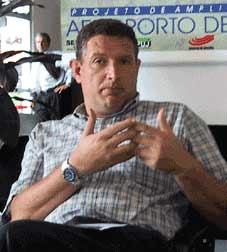
Jordi Castan,
cut foliage producer and landscaping designer, together with his wife Juliana,
runs the "Jardinagem Boa Vista" enterprise
with 18 employees at Joinville in the south
of Brazil. He is the President of the Foundation Entrepreneur;
a member of the board
of Directors of the Association of Commerce and Industry of Joinville;
a member of the Cut
Foliage Nucleus since 1991 - having been its President for some years; shareholder and Director of the MERCAFLOR, a market for cut foliage
products created together with other local cut foliage entrepreneurs; the Secretary for Economic Development of
Joinville for three years; and, most important in this context, he participated in
the development and dissemination of the Nucleus Approach in Brazil, Argentina, Uruguay,
Paraguay and Chile.
How did your Cut Foliage Nucleus start?
"Our Nucleus? In the beginning it seemed strange to
be sitting together with my competitors, all of us full of mistrust, and now
we were going to talk openly about our businesses, our difficulties, and to exchange ideas and experiences - but
surprisingly, it worked. It turned into a sensation for us. After some time my colleagues
actually came to ask: 'When is the next meeting? We have to
proceed!'
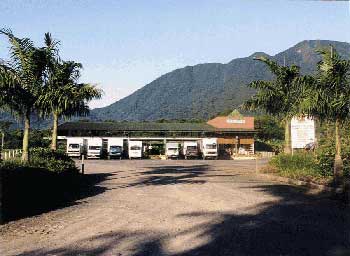
In the second year, we started to sell and buy
products among ourselves in
order to expand the variety of plants offered to our individual clients. Now
there was no need any more for all of us to produce all the varieties, which
considering the small quantities, had been a relatively expensive affair, and
thus saved much money. It took a lot of trust among us to do this, and it took quite
some time until
it worked. But it did work, and six years later, some of us were ready to invest
in a
joint enterprise; we started the MERCAFLOR, which is now
one of the most important cut foliage markets in southern Brazil.
Most important: Before this, everyone of us
worked isolated in his or her enterprise. This was the only place we knew. We had no
idea whether we were doing better or worse with our enterprise and products than
others. But then, through the Nucleus, the doors of the other
cut foliage enterprises opened, we were able to see how the others did business.
Something started, the experts call it 'benchmarking'. This
gave us a lot of food for thought - ideas for new activities and improvements.
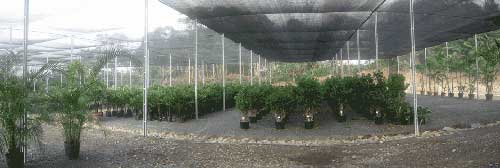
First we visited each other, at the local level. Then we went together to São
Paulo and other regions in Brazil. And later we travelled as a group to
Argentina, Germany, Spain, Costa Rica and other countries. Today, we know where we
stand
with our enterprises - and what we still have to do!"
How did the 'Nucleus Approach' develop?
"No, we did not just copy the German chamber model. It
was clear right from the beginning that this would not work due to our different culture, history, social and economic
situation. But we learnt
from our partner, the Munich Chamber, how to decide on services to be offered
to the members and how to provide them, how to professionalize a chamber and how to run a chamber as a
proper enterprise.
From German Technical
Cooperation we learnt methodologies of planning, organization and communication
as well as inter-cultural cooperation.
In addition, we used ideas and
experiences of chambers and international projects from other Latin American
countries.
All this we combined with our own Brazilian traditions and
ways of managing a chamber. And, of course, we used our brains, discussed,
disputed, changed, faced a lot of frustrating experiences and celebrated our successes.
Thus, step-by-step, we developed something what was
later
called the 'Nucleus Approach'."
Why did it work in Brazil ?
"Very simple: It worked because the time was ripe.
Had we started the same approach in 1980
it would have been a total failure. The business
association, this club of big bosses, would not have opened the doors for us
small entrepreneurs. But the eighties had been a lost decade in Latin America,
with hyperinflation and frequent economic shocks. The economy went only
in one direction : downwards.
In 1991, the partnership of the business association
with the Munich Chamber started. At approximately the same time, globalization
set in. Brazil opened its borders. It was an opportune moment. More and more
entrepreneurs, owners of small, medium and big enterprises became aware that
things had to change. We needed other forms of cooperation - how could we
expect enterprises to prosper in a hostile environment where everyone
perceives the other not only as a competitor but as a personal enemy? Also, it
became clear that the traditional Brazilian way of sitting and hoping for the
Government to solve our problems, to do something for us - this had worked
successfully for centuries - would no longer be
adequate. No, changes had to start at our local level, in our enterprises and
in our chambers! We, the entrepreneurs, had to change something. But nobody
knew what and, more so, how!
I remember very well our first planning workshop with
the Munich Chamber. There sat the owners of the big companies in our
town, the members of the board of directors of our Association of Commerce and
Industry. The association had just celebrated its 90th anniversary,
and we were very proud of it. All agreed unanimously, 'Yes, the others, these
SMEs, they have problems - therefore they have to change.' But then, hours
later, after long heated discussions, we came to a totally different
conclusion: 'Yes, the SMEs encounter a lot of problems - to solve them, we
first have to change our chamber!' Then and there the idea of a Nucleus
of entrepreneurs as part of the business association fitted perfectly.
Afterwards, everyone seemed happy with this planning workshop and its
results. But there was a problem: Nobody believed in the decisions! We had made so many
plans before, and almost nothing had worked out. So why should it be
different this time?
But then a real sensation came up: The plan worked. More
and more entrepreneurs came to our association and said: 'I want to
participate, too!'
Here lies another answer to 'Why did the Nucleus
Approach work?' If someone had come from Germany or another country and told
us to do this and that, if the Munich Chamber and its counsellor had tried to manipulate
us - no, then it would
not have worked: Brazilians are too sceptical, too proud... .
The Nucleus is not a German or another industrialized
country's invention. We Latin American entrepreneurs developed it
ourselves, in
cooperation with others here in Brazil. It is our own product! And that is
why more and more entrepreneurs and the associations started to accept it.
Today we can say that we developed a
model of a business chamber in the tropics. - This makes us very proud."
What changed in the enterprises?
"Oh, quite a lot. To start with my own enterprise, in
the beginning, my wife and I owned a small piece of land, we had four
employees, and we produced what we liked - hoping that some local
people would pass by and buy it. From time to time, I got a contract
to design a garden. - Today, we have four times as much land and employ 18
persons. Together with my Nucleus colleagues we watch the market and concentrate on
the production of plants which the market demands. Our
geographical market
expanded. Due to MERCAFLOR our products now go 600 km north to São
Paulo as well as 800 km south and west. And I design the landscaping of gardens
in many more Brazilian regions.
Now I really am in business!
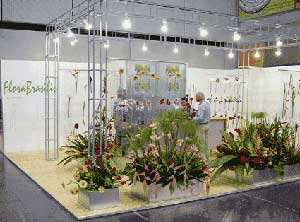
The future? Yes, there is one way only: We have to
continue to grow, to grow and to grow - in quantity, quality
and management.
There is still a long way to go. We are prepared to buy some more land ... the
market is there. And what is more important for Juliana, my wife, and me as
SMEs, we have a perspective that our enterprise will continue: Our son, now 17
years old, is gaining interest in the business. And he might have the
necessary entrepreneurial characteristics...
Not all but a lot of my colleagues followed the same
route. Today we can say, Joinville and the region, due to our joint effort,
turned into a centre for cut foliage in Brazil.
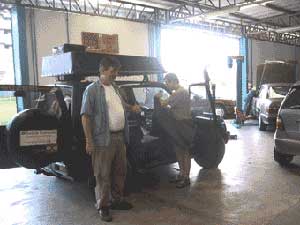
The approach worked for many entrepreneurs of other
sectors, too. Look at my cousin Paulo, a car mechanic. He used to repair racing
vehicles - without making any money. Really crazy. I asked
him, would join a Nucleus? - no, no interest.
Anyway, the Nucleus started. And one day he came. He
visited Germany. That opened his eyes. He studied hard, passed some tests and gained the official title of
German Master in motor mechanics. He was elected Nucleus president, leading
the biggest Nucleus ever with more than 120 members. Later he was invited by chambers in Brazil, Argentina and Uruguay to conduct technical
training courses and to explain how the Nucleus of Car Mechanics works. In other
words: He became a true entrepreneur. Today he runs one of the best equipped workshops in southern Brazil.
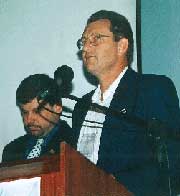
Or do you remember Nivaldo Rupp, the carpenter? When
we first visited his tiny carpentry in 1991, my goodness, what a mess! But he
had an idea: He wanted to produce spiral staircases. He saw a market for it.
But he did not know at all how to construct them. Then came this German
Carpenter, Christian Treffer from Munich, from whom he learned some new
technologies - but still he was not able to produce these spiral staircases. Then
he scratched together the little money he had, took a three months practical
training in Germany, visited the International Trade Fair of Crafts and Small
Industries in Munich together with 120 other Brazilian Nucleus entrepreneurs.
Yes, he suffered there, without his family for such a long time, worried
about his company ... But he came back and made it: Now he knew how to construct
spiral staircases. And he gained a huge market for it, selling them as far as São
Paulo. When you now go to visit his workshop, you will not recognize it - it
looks really professional.
Last week our Federation of Chambers of Commerce and Industry honoured him and
his Carpenter Nucleus as the first Brazilian Nucleus with a true Nucleus success story.
I could tell many similar cases, about architects, bakers, hairdressers, light engineers,
hotels and restaurants and many,
many more.
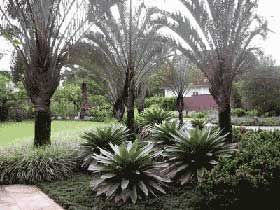
The focal point of the Nucleus was that nobody told
us what to do or how
to do it! We had to find out ourselves, together with the chamber Nucleus counsellor. And
with all of us together in the
Nucleus, this became possible. We started to learn, to study, to compare, to develop
trust, self-confidence and courage. We grew personally, and turned from being
mere producers into true entrepreneurs.
In
the beginning of the nineties, there was a common proverb in Brazil, 'What is
big, is good. And what is good, is big!' So everybody dreamt of owning a big
company. SMEs? - no, these were pure rubbish, without
any social reputation. - This changed, also because of the Nuclei - nobody
talks like that any more. SMEs, and this is the message today, in many sectors
are much more efficient, more flexible and faster than big companies. In
addition, they create jobs, income and economic growth. As long as they are
good!"
What changed in the business associations ?
"That is easy to say, just by
comparison: In
1990, our Association of Commerce and Industry had about 250 members, perhaps
40 of them active ones. It was dominated by a couple of owners of big enterprises,
doing a little bit of what they called 'lobbying', running after the
authorities and asking for personal favors. There was a CEO, who served as assistant to
the president. There were some employees in the administration, most
of them, from today's perspective, were more or less useless. For us SMEs, this
association served for absolutely nothing.
Today, things are different. Today, we have a real
mission: 'Promotion, development, representation, defense, and increase
of our
member enterprises' competitiveness, in order to contribute to improving the quality of life in our community.' Our objective
is to be recognized
by the community and the entrepreneurs as an excellent service institution.
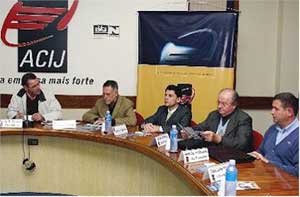
Now we have 1,200 members. 80% of them are SMEs. The
association, the ACIJ, maintains a professional team of employees who
run the
association rather like an enterprise. We offer a wide range of services to the
members, more than 20 Nuclei, training, trade fairs, and many others. We are actively involved in the development of the town of Joinville,
contributing to its economic and social improvement. Not only here but in many other places, the associations
have turned into a respectable power, a
partner for the public administration in search of solutions for the community.
Our public relations changed - see our weekly
information letters distributed per e-mail, one addressed especially to the
Nucleus members. And see our web page www.acij.com.br
, showing what is going on.
The association is now accepted by the SMEs as their
own. Small, medium and big enterprises cooperate under one roof.
I was the first SME elected into the board of directors, acting there for a long
time as Secretary. Everyone pays membership fees according to the company
size, which is by no means low - a minimum of about 20 US$ per month, a
maximum of 2,000 US$ per month - not per
year! For many enterprises this is a real burden. But they pay nonetheless, because they
all get a satisfactory return.
Two years ago, and this was another huge step, the
association was one of the first associations in Brazil
to pass the ISO 9002 .
All this was a long process, slowly, with a lot of set
backs. No, of course, we have not finished yet, there
are still many things to do, the development must go on... We have a vision, and that counts.

Alone, we would never have made it. It worked
because first some other associations in our region started along this road, then
more and more; it became a movement. Our federation entered and changed, and today almost 900
Brazilian Associations of Commerce in Industry run Nuclei, they
started along the same road."
What would you like to tell the Sri Lankan chambers and Nucleus entrepreneurs ?
"Sri Lanka? Give me a ticket and I'm on the
next plane there. Sri Lanka is a dream for a Brazilian cut foliage producer - this huge
variety of tropical plants ...
The Nuclei in Sri Lanka, I would really like to see
them. And also their chambers. And certainly we can exchange a lot of ideas
and experiences.
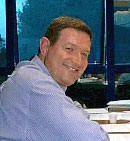
I presented the Nucleus Approach in a lot of places over all these years, in
neighbouring towns, 30 or 90 km from here, in the northeast of Brazil -
where people dislike everything which comes from the south - and in many Latin American countries.
Every time
it was the same and I always got to hear, 'Yes, that might work there in Joinville,
in the south of
Brazil, but here, everything is different, our entrepreneurs, our associations
and chambers ...'. Listen, may be this is human, but
why do entrepreneurs right away start to stress the differences? Why don't
they stress what we have in common? That is much more interesting! And I learnt in all these
places that we, the SMEs, we, the chambers, we have a lot in common. Much more
than most of us imagine. And if I can during such a presentation lead
the discussion into this direction - sometimes it is really difficult - then
people start to open their ears, they gain interest, things start to move ...
No, the point is of course not just to copy and to
transfer the Brazilian Nucleus Approach to Sri Lanka. This does not work. The
Sri Lankan entrepreneurs, their chambers, they have to define their own
Nucleus programme! I can explain how we did it, what we did wrong, what
worked, and why. But in the end, the Sri Lankan entrepreneurs have to
undergo their own experiences, define their own objectives, start their own
activities and take some risks. If the Nucleus develops as a true Sri Lankan
programme, then it may work ... This is exactly the way Nuclei started in all
these Brazilian places and other countries.
Sri Lanka? So what
did you say about the flight ticket
.... ?"
Supplement:
Jordi Castan came to Sri Lanka in 2005 and worked there very successfully
with the Cut Foliage Nuclei of Kandy, Matale and Badulla.
In 2008 he started consultancy
of AAPOP - GTZ, Algeria, to accompany
the implementation of the Nucleus Approach.
Since
2009 he is involved in the introduction of the Nucleus Approach
through the AL INVEST Program in Bolivia, Peru, Ecuador and
Colombia.
 Download of the interview (pdf)
Download of the interview (pdf) |